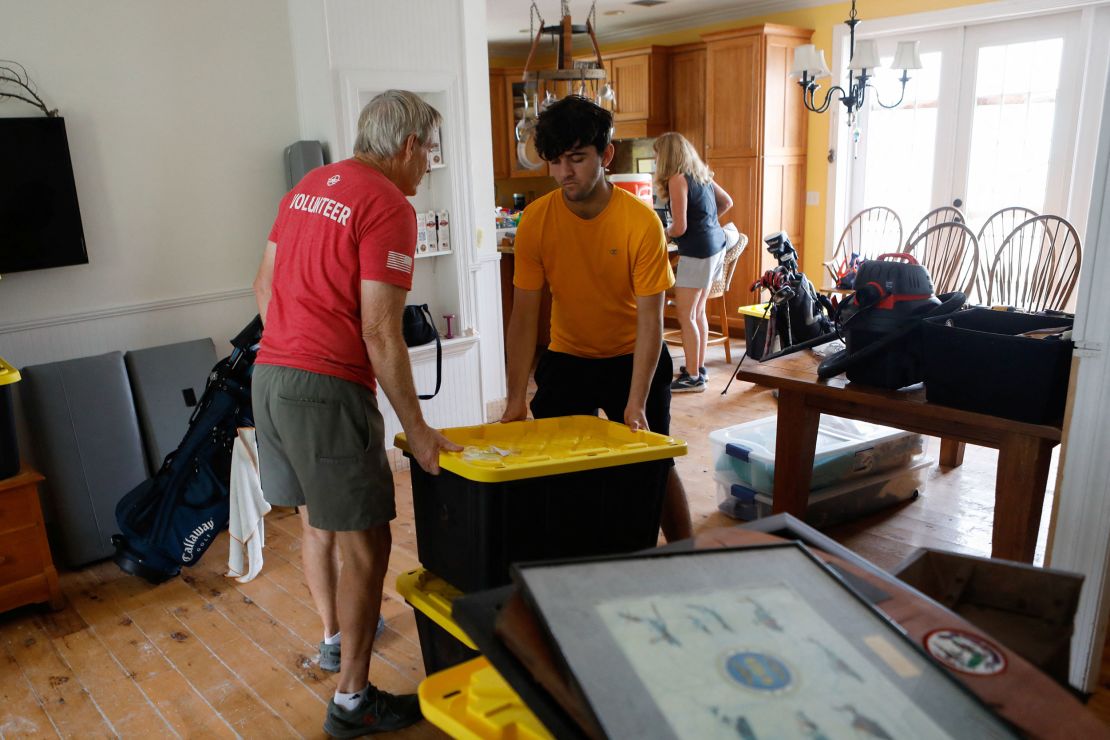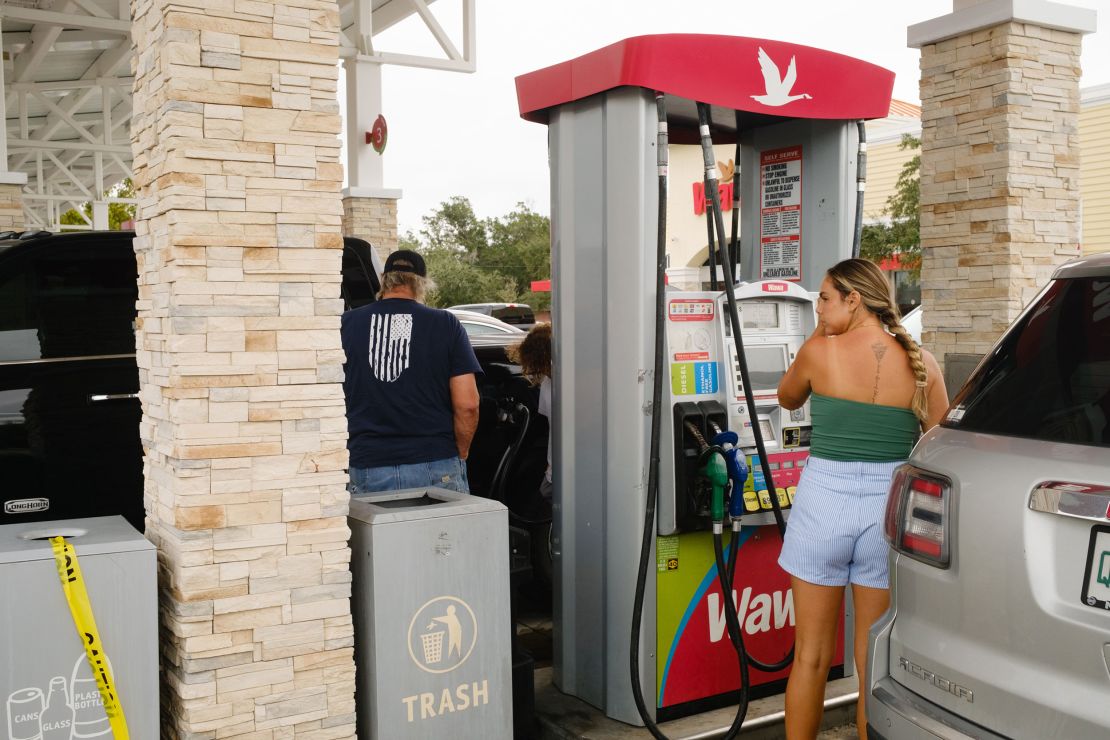Driving on highway shoulders, gas shortages and booked up hotels.
Those are some of the complications Floridians are facing as they make and execute plans to leave their homes under the largest evacuation order they’ve seen since 2017. They’re bracing for Hurricane Milton less than two weeks after Hurricane Helene pummeled Florida’s Big Bend as a Category 4 storm, leaving at least 20 dead in the state with officials warning Milton’s impact could be even more severe and far-reaching.
“I can say without any dramatization whatsoever, if you choose to stay in one of those evacuation areas, you’re going to die,” Tampa Mayor Jane Castor told CNN’s Kaitlan Collins Monday, strongly urging residents to heed the warnings before it’s too late.
The state’s Division of Emergency Management is preparing for the largest evacuation since 2017, Director Kevin Guthrie said Sunday at a news conference with Florida Gov. Ron DeSantis, who declared a state of emergency for 51 of the state’s 67 counties.

And as if residents don’t have enough to worry about as they try to evacuate, the National Weather Service office in Miami warns scattered tornadoes might hinder those emergency plans.
“Several places may experience tornado damage with a few spots of considerable damage, power loss, and communication failures,” the agency said.
Highway shoulder opens for evacuees
To help facilitate evacuations, people using interstate highways to flee can use the left shoulder lane to keep traffic moving, the Florida Department of Transportation announced on Monday, a move that’s typically reserved only for emergencies such as hurricanes.
“To help facilitate evacuations … Emergency Shoulder Use (ESU) plans are actively being put in place for Eastbound I-4 and portions of Northbound I-75,” the Florida DOT said in a post on X.
The traffic flow changes are also meant to ensure that supplies, emergency services and utility crews can get to areas potentially impacted by the storm.
“Law enforcement and signage will alert motorists on when to enter and exit the shoulder,” the agency added.
Florida is also waiving tolls on Veterans Expressway and Suncoast Parkway, two parts of a state road that extends north from Tampa, so they can be used as evacuation routes, DeSantis said Tuesday.
In pictures: Hurricane Milton unleashes its fury
The Department of Transportation is monitoring traffic conditions along emergency shoulder routes as residents evacuate, and it said although heavy and slow, “traffic is still flowing and moving as intended.”
As many of the evacuees head north into Georgia through Atlanta, Peach Pass, the state’s electronic toll system, is also making traffic changes to assist the overflow of traffic, shifting some of its southbound lanes into northbound lanes, the toll authority said Monday.
Available hotels are hard to find
For those leaving their homes, alternative accommodation in hotels or rental properties is turning out to be costly and difficult to find as many are at capacity.
The Florida-based hotel group Rosen Hotels & Resorts activated its Florida Resident Distress Rates for those in need of a place to stay in other parts of the state. Meanwhile, cities as far as 400 miles north, such as Dothan, Alabama, have reported no vacancy at their area hotels.
Expedia, Priceline and vacation rental site Vrbo activated emergency policies for travelers whose vacation plans will be affected by Hurricane Milton, according to their sites.
For campers or recreational vehicle owners looking for a safe place to travel to, Atlanta Motor Speedway is opening its campgrounds to the hundreds of thousands of people evacuating their Florida homes. It’s providing dry camping, with no water or electricity hookups, free of charge in its Legends Premium Campground for RVs and Legends Tent Campground for pop-up campers and tents, Executive Vice President and General Manager Brandon Hutchison said in a news release.
“We have hundreds of acres of campgrounds and opening up our facility is an easy choice to make,” Hutchison said. “If you’re in Milton’s path and looking for a place to stay, we’re here for you.”
Located 30 miles south of Atlanta in Hampton, Georgia, the speedway is making campgrounds freely available to evacuees for RV and tents, providing access to shower facilities in collaboration with the Henry County Emergency Management Agency.
The campgrounds hosted evacuees during previous hurricanes including Irma in 2017, Florence in 2018 and Idalia last year, the speedway said.
Gas stations running out of fuel
Further complicating the evacuation process is demand for gasoline. The state of Florida is trying to keep gas stations supplied as people try to fill up before hitting the road. Others who decide to ride out the severe weather at home are also crowding the pumps, filling gas tanks to power their generators if they lose electricity for an extended period of time.

“Lines at gas stations have been long,” DeSantis acknowledged Tuesday during a news conference. “Gas stations are running out quicker than they otherwise would.”
Gas price tracking service GasBuddy reported that as of Tuesday afternoon, 17.4% of gas stations statewide were without fuel, a dramatic spike from just 3% on Monday. The situation was far worse in areas facing mandatory evacuation orders. In Fort Myers, on the state’s Gulf Coast, 70% of stations were without gas as of Monday night.
To help combat those shortages, the state is distributing fuel from its own reserves, which include more than 100,000 gallons of gasoline. An additional 1.2 million gallons of gasoline and diesel are en route to the state, the governor said, noting the Florida Highway Patrol escorted 27 fuel trucks to deliver fuel to stations in the anticipated impact area of the storm.
CNN’s Chris Boyette, Liz Enochs, Andy Rose, Chris Isidore and Matt Egan contributed to this report.






































































